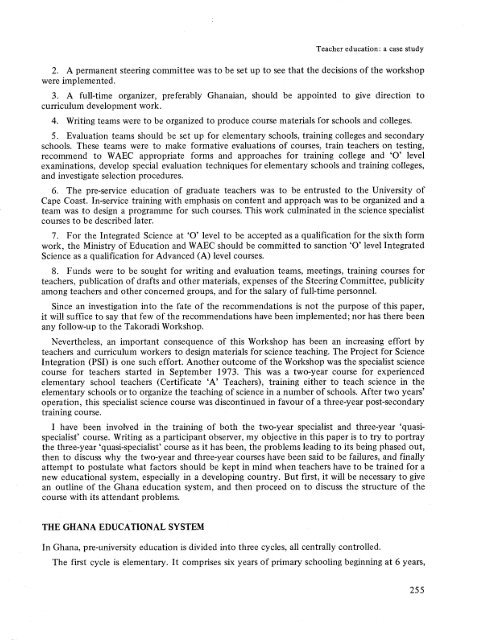New trends in physics teaching, v.4; The ... - unesdoc - Unesco
New trends in physics teaching, v.4; The ... - unesdoc - Unesco
New trends in physics teaching, v.4; The ... - unesdoc - Unesco
Create successful ePaper yourself
Turn your PDF publications into a flip-book with our unique Google optimized e-Paper software.
Teacher education: a case study<br />
2. A permanent steer<strong>in</strong>g committee was to be set up to see that the decisions of the workshop<br />
were implemented.<br />
3. A full-time organizer, preferably Ghanaian, should be appo<strong>in</strong>ted to give direction to<br />
curriculum development work.<br />
4. Writ<strong>in</strong>g teams were to be organized to produce course materials for schools and colleges.<br />
5. Evaluation teams should be set up for elementary schools, tra<strong>in</strong><strong>in</strong>g colleges and secondary<br />
schools. <strong>The</strong>se teams were to make formative evaluations of courses, tra<strong>in</strong> teachers on test<strong>in</strong>g,<br />
recommend to WAEC appropriate forms and approaches for tra<strong>in</strong><strong>in</strong>g college and ‘0’ level<br />
exam<strong>in</strong>ations, develop special evaluation techniques for elementary schools and tra<strong>in</strong><strong>in</strong>g colleges,<br />
and <strong>in</strong>vestigate selection procedures.<br />
6. <strong>The</strong> pre-service education of graduate teachers was to be entrusted to the University of<br />
Cape Coast. In-service tra<strong>in</strong><strong>in</strong>g with emphasis on content and approach was to be organized and a<br />
team was to design a programme for such courses. This work culm<strong>in</strong>ated <strong>in</strong> the science specialist<br />
courses to be described later.<br />
7. For the Integrated Science at ‘0’ level to be accepted as a qualification for the sixth form<br />
work, the M<strong>in</strong>istry of Education and WAEC should be committed to sanction ‘0’ level Integrated<br />
Science as a qualification for Advanced (A) level courses.<br />
8. Funds were to be sought for writ<strong>in</strong>g and evaluation teams, meet<strong>in</strong>gs, tra<strong>in</strong><strong>in</strong>g courses for<br />
teachers, publication of drafts and other materials, expenses of the Steer<strong>in</strong>g Committee, publicity<br />
among teachers and other concerned groups, and for the salary of full-time personnel.<br />
S<strong>in</strong>ce an <strong>in</strong>vestigation <strong>in</strong>to the fate of the recommendations is not the purpose of this paper,<br />
it wil suffice to say that few of the recommendations have been implemented; nor has there been<br />
any follow-up to the Takoradi Workshop.<br />
Nevertheless, an important consequence of this Workshop has been an <strong>in</strong>creas<strong>in</strong>g effort by<br />
teachers and curriculum workers to design materials for science teach<strong>in</strong>g. <strong>The</strong> Project for Science<br />
Integration (PSI) is one such effort. Another outcome of the Workshop was the specialist science<br />
course for teachers started <strong>in</strong> September 1973. This was a two-year course for experienced<br />
elementary school teachers (Certificate ‘A’ Teachers), tra<strong>in</strong><strong>in</strong>g either to teach science <strong>in</strong> the<br />
elementary schools or to organize the teach<strong>in</strong>g of science <strong>in</strong> a number of schools. After two years’<br />
operation, this specialist science course was discont<strong>in</strong>ued <strong>in</strong> favour of a three-year post-secondary<br />
tra<strong>in</strong><strong>in</strong>g course.<br />
I have been <strong>in</strong>volved <strong>in</strong> the tra<strong>in</strong><strong>in</strong>g of both the two-year specialist and three-year ‘quasispecialist’<br />
course. Writ<strong>in</strong>g as a participant observer, my objective <strong>in</strong> this paper is to try to portray<br />
the three-year ‘quasi-specialist’ course as it has been, the problems lead<strong>in</strong>g to its be<strong>in</strong>g phased out,<br />
then to discuss why the two-year and three-year courses have been said to be failures, and f<strong>in</strong>ally<br />
attempt to postulate what factors should be kept <strong>in</strong> m<strong>in</strong>d when teachers have to be tra<strong>in</strong>ed for a<br />
new educational system, especially <strong>in</strong> a develop<strong>in</strong>g country. But first, it will be necessary to give<br />
an outl<strong>in</strong>e of the Ghana education system, and then proceed on to discuss the structure of the<br />
course with its attendant problems.<br />
THE GHANA EDUCATIONAL SYSTEM<br />
In Ghana, pre-university education is divided <strong>in</strong>to three cycles, all centrally controlled.<br />
<strong>The</strong> first cycle is elementary. It comprises six years of primary school<strong>in</strong>g beg<strong>in</strong>n<strong>in</strong>g at 6 years,<br />
255
















